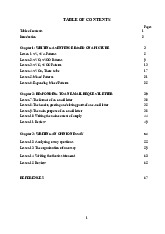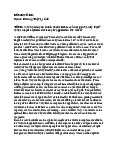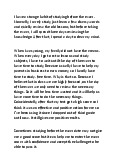


Preview text:
1. TRADITIONAL - MODERN – CULTURAL
Losing traditional cultures -
the advances in technology that have driven industrialisation in developed
countries have certainly contributed to the disappearance of traditional ways of life -
in the past, generations of families grew up in the same small village communities -
These communities had a strong sense of identity, due to their shared customs and beliefs -
developments in transport, communications and manufacturing lead to the
dispersal of families and village communities as people migrate to the cities in search of work -
nowadays, most city residents are migrants from neighbouring
provinces and they do not know their closest neighbours
traditional cultures still thrive -
in some parts of the world traditional cultures still thrive -
for example, there are tribes in the remote areas of the world that have
been completely untouched by the technological developments of the developed world -
These tribal communities continue to hunt and gather food from the
forest, and traditional skills are passed on to children by parents and elders. -
in parts of Africa, dwellers seize communications technologies to support their culture – farming -
they use mobile phones to access information, from weather predictions to
market prices, which helps them to prosper
opinions about traditional ideas -
many of the ideas that elderly people have about life are becoming less relevant for younger people -
for example, in the past, people were advised to learn a profession and
find a secure job for life, but today’s workers expect much more variety
and diversity from their careers -
the ‘rules’ around relationships are being eroded as young adults make
their own choices about who and when to marry -
But perhaps the greatest disparity between the generations can be seen in
their attitudes towards gender roles -
The traditional roles of men and women, as breadwinners and
housewives, are no longer appropriate for young generations -
some traditional views and values are certainly applicable to the modern world -
For example, older generations attach great importance to working hard,
doing one’s best, and taking pride in one’s work, and these behaviours can
surely benefit young people as they enter today’s competitive job market -
Other characteristics that are perhaps seen as traditional are politeness and good manners -
In our globalised world, young adults can expect to come into contact
with people from a huge variety of backgrounds, and it is more important
than ever to treat others with respect -
young people would lead happier lives if they had a more ‘old-fashioned’
sense of community and neighbourliness. Traditional festivals -
People nowadays want to enjoy themselves in traditional festival -
Traditional festivals have become special occasions when people can take some days off -
In Vietnam, Hung temple festival is a good example of a festival
time when people are largely concerned with shopping, decorating
their homes, enjoying traditional meals with their families or meeting friends -
Most people look forward to this festival as a holiday period, rather
than a time to join the pilgrimage to ancestral land -
However, the underlying meaning of such festivals has been forgotten -
In Vietnamese primary school, children learn in detail about the reasons
for celebrating Hung temple festival and a variety of other festivals -
Many schools also organize art performance activities in festival time -
Families also play a role in passing knowledge of religious festivals’
deeper significance on to the next generation
Opinions about charging froreign visitors more than local
redidents when they visit cultural and historical attractions: -
it is a shortsighted view to force foreign visitors to pay more when
they visit cultural and historical attractions -
Tourists from overseas contribute to the economy of the host country with
the money they spend on a wide range of goods and services, ranging
from food, souvenirs to accommodation and travel. -
The governments and inhabitants of every country should be happy to
subsidise important tourist sites and encourage people from the rest of the world to visit them -
If travellers realised that they would have to pay more to visit historical
and cultural attractions in a particular nation, they would perhaps decide
not to go to that country on holiday -
To take the UK as an example, the tourism industry and many related jobs
rely on visitors coming to the country to see places like Windsor Castle or Saint Paul’s Cathedral -
These two sites charge the same price regardless of nationality, and this
helps to promote the nation’s cultural heritage -
If overseas tourists stopped coming due to higher prices, there would be a
risk of insufficient funding for the maintenance of these important buildings. Opinions about museums -
it can be argued that the main role of a museum is to entertain -
Museums are tourist attractions, and their aim is to exhibit a collection of
interesting objects that many people will want to see. -
The average visitor may become bored if he or she has to read or listen to
too much educational content, so museums often put more of an emphasis
on enjoyment rather than learning. -
This type of museum is designed to be visually spectacular, and may have
interactive activities or even games as part of its exhibitions. -
some people argue that museums should focus on education. -
The aim of any exhibition should be to teach visitors something that they did not previously know. -
Usually this means that the history behind the museum’s exhibits needs to
be explained, and this can be done in various ways. -
Some museums employ professional guides to talk to their visitors, while
other museums offer headsets so that visitors can listen to detailed
commentary about the exhibition. -
In this way, museums can play an important role in teaching people about
history, culture, science and many other aspects of life.




